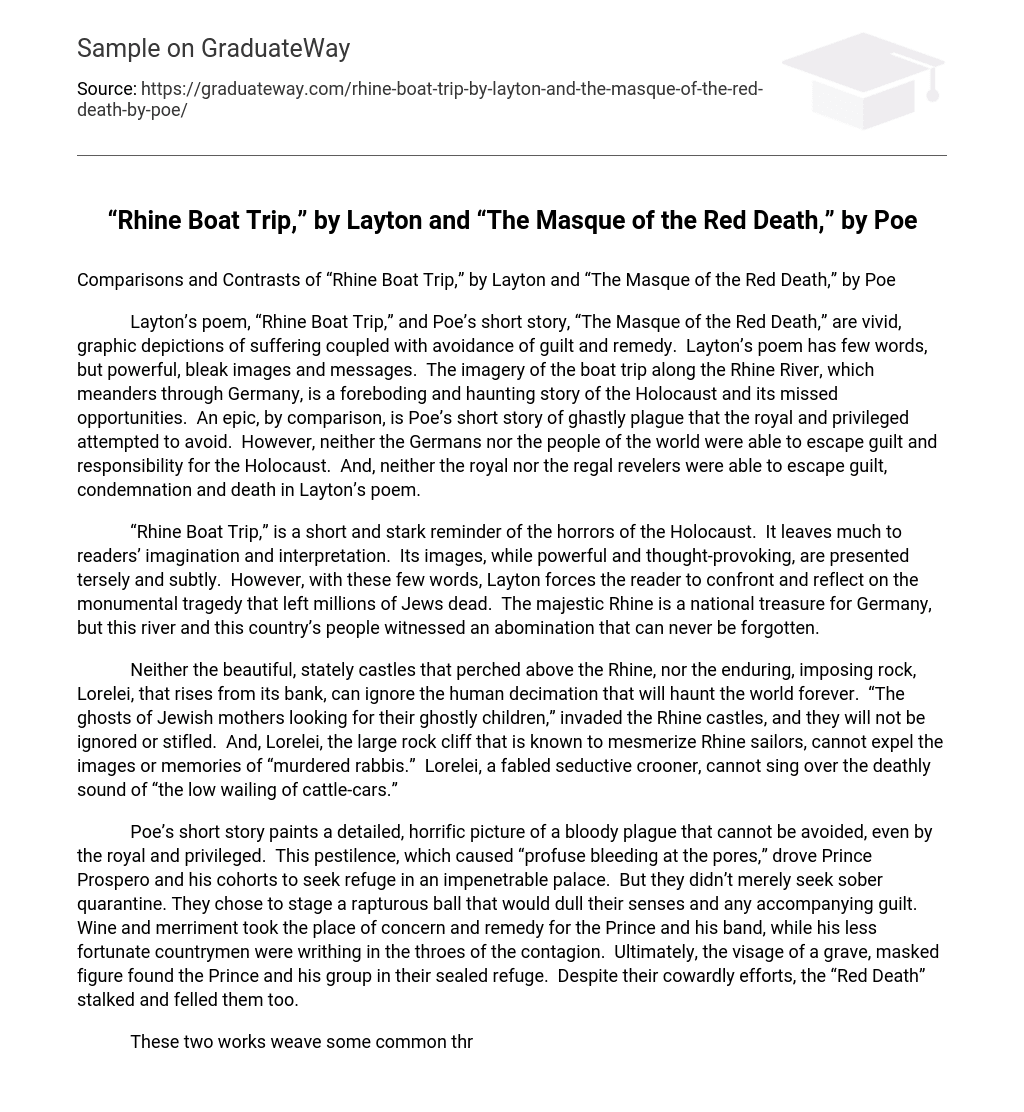Layton’s poem, “Rhine Boat Trip,” and Poe’s short story, “The Masque of the Red Death,” are vivid, graphic depictions of suffering coupled with avoidance of guilt and remedy. Layton’s poem has few words, but powerful, bleak images and messages. The imagery of the boat trip along the Rhine River, which meanders through Germany, is a foreboding and haunting story of the Holocaust and its missed opportunities.
An epic, by comparison, is Poe’s short story of ghastly plague that the royal and privileged attempted to avoid. However, neither the Germans nor the people of the world were able to escape guilt and responsibility for the Holocaust. And, neither the royal nor the regal revelers were able to escape guilt, condemnation and death in Layton’s poem.
“Rhine Boat Trip,” is a short and stark reminder of the horrors of the Holocaust. It leaves much to readers’ imagination and interpretation. Its images, while powerful and thought-provoking, are presented tersely and subtly. However, with these few words, Layton forces the reader to confront and reflect on the monumental tragedy that left millions of Jews dead. The majestic Rhine is a national treasure for Germany, but this river and this country’s people witnessed an abomination that can never be forgotten.
Neither the beautiful, stately castles that perched above the Rhine, nor the enduring, imposing rock, Lorelei, that rises from its bank, can ignore the human decimation that will haunt the world forever. “The ghosts of Jewish mothers looking for their ghostly children,” invaded the Rhine castles, and they will not be ignored or stifled. And, Lorelei, the large rock cliff that is known to mesmerize Rhine sailors, cannot expel the images or memories of “murdered rabbis.” Lorelei, a fabled seductive crooner, cannot sing over the deathly sound of “the low wailing of cattle-cars.”
Poe’s short story paints a detailed, horrific picture of a bloody plague that cannot be avoided, even by the royal and privileged. This pestilence, which caused “profuse bleeding at the pores,” drove Prince Prospero and his cohorts to seek refuge in an impenetrable palace. But they didn’t merely seek sober quarantine. They chose to stage a rapturous ball that would dull their senses and any accompanying guilt. Wine and merriment took the place of concern and remedy for the Prince and his band, while his less fortunate countrymen were writhing in the throes of the contagion. Ultimately, the visage of a grave, masked figure found the Prince and his group in their sealed refuge. Despite their cowardly efforts, the “Red Death” stalked and felled them too.
These two works weave some common threads that paint ghastly images and force reflection that may avert future tragedies. Bleeding through the pores, millions of pores, evokes thoughts of the millions of Jews who suffered and perished. Conversely, the red death killed in thirty minutes, while the planning and implementation of the Jewish extermination took years.
The ebony clock in the seventh chamber of the castle struck a tone that sobered the revelers and caused trepidation. And Lorelei, the menacing rock on the bank of the Rhine, sang sweet tones to unwary sailors. However, neither of these soft tones could mask the dreadful sound of suffering and death that the red plague and the Holocaust bellowed.
Finally, the cattle cars in Germany moved “invisibly across the land,” while Poe’s revelers were forced to acknowledge the horror that the masked intruder personified. Justice prevailed when the helpless victims in both stories could no longer be ignored. Their plight made an indelible mark that may spark bravery and action rather than guilt denial and retreat from those who can remedy oppression.





